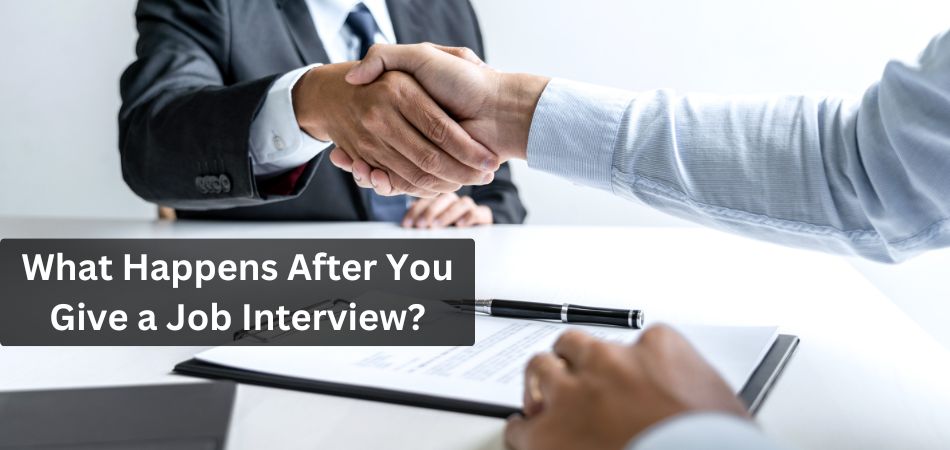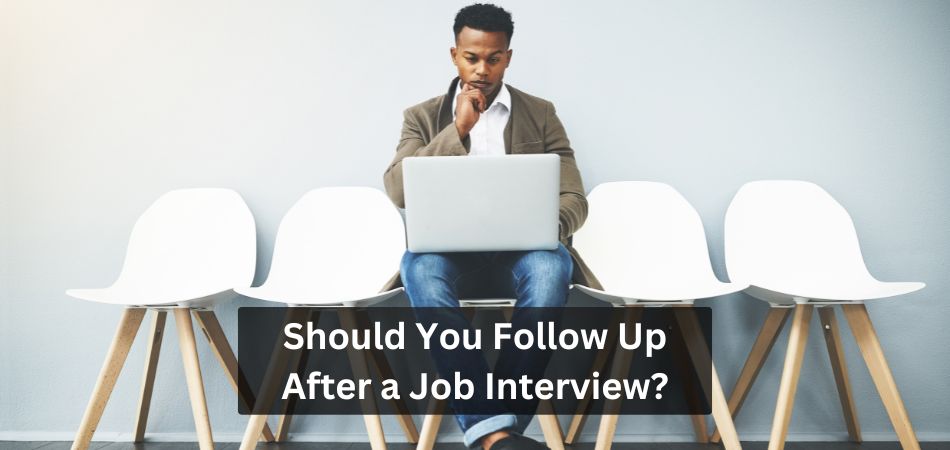The job interview is over, and you’ve finally exhaled after days of preparation, fine-tuning your resume, and perfecting your answers. You leave the room, replaying every question and response in your mind, wondering if you nailed it—or missed the mark. Now comes the hardest part: waiting. But have you ever wondered what happens after you give a job interview?
After you give a job interview, employers review feedback, compare candidates, conduct reference checks, and finalize decisions before communicating outcomes, preparing offers, or planning onboarding for selected candidates.
Ready to clear up the process and boost your chances of success? Keep reading to figure out what employers are looking for and how to stand out even after the interview is over!
What Makes a Good Interview?
A good interview is crucial to landing your dream job, but what does it take to truly stand out? Beyond preparation, it’s about creating a meaningful connection and showcasing your value to the company. Let’s explore the key elements that transform an average interview into an exceptional one.

Thorough Preparation Sets the Foundation
A great interview starts long before you step into the room or join the call. Researching the company’s values, culture, and recent accomplishments shows genuine interest. Preparing answers to common questions ensures you’re ready to communicate your experience effectively.
Clear Communication is Key
A good interview involves articulating your skills and experiences in a concise, confident manner. Avoid rambling by focusing on key achievements relevant to the job. Remember, clarity not only conveys professionalism but also makes your answers memorable.
Engagement and Active Listening Create Impact
Engaging with your interviewer shows that you’re genuinely interested in the role. Active listening allows you to personalize your responses to their questions and concerns. Asking thoughtful questions about the company and role demonstrates initiative and curiosity.
Confidence Without Arrogance Wins Trust
Confidence signals that you believe in your ability to succeed, but overconfidence can be off-putting. Strike a balance by highlighting your strengths without dismissing areas where you’re still learning. This humility combined with confidence makes you relatable and trustworthy.
Genuine Connection Leaves a Lasting Impression
People hire people, not resumes—building rapport with your interviewer is essential. Show authentic enthusiasm for the role and company culture. Ending the interview with a warm thank-you and follow-up reinforces your interest and professionalism.
Signs That Your Interview Took Place Well
You’ve completed the interview, and now you’re analyzing every detail, wondering if it went well. While it’s impossible to be 100% certain, there are often clear signs that indicate a positive outcome. Here are some key indicators that suggest your interview was a success.
Interview Ran Longer Than Scheduled
If the interviewer extended the conversation beyond the allotted time, it’s a good sign they were genuinely interested. This often means they wanted to delve deeper into your qualifications and fit for the role. Time is valuable, and they wouldn’t spend extra minutes unless they saw potential.
Interviewer Seemed Genuinely Engaged
Positive body language, attentive listening, and follow-up questions indicate that the interviewer was interested in what you were saying. If they appeared enthusiastic or even nodded in agreement frequently, it’s a sign your answers resonated with them. Engagement shows that they see you as a strong candidate.
They Spoke About “Next Steps” in Detail
When interviewers explain the hiring timeline or the next phases of the process, it’s a strong signal they’re considering you. Specifics like when you’ll hear back or what the final interview entails mean you’re being seriously evaluated. This demonstrates their intent to keep you in the running.
You Were Introduced to Team Members or Managers
If you met with other staff members during or after the interview, it often means they’re gauging how well you’d fit within the team. Companies rarely invest this effort unless they’re genuinely interested in hiring you. These introductions can also serve as a preview of your potential work environment.
Interviewer Highlighted Benefits or Opportunities
When the discussion shifts to what the company can offer you, it’s a positive sign. Highlighting benefits, growth opportunities, or perks indicates they want to sell the role to you. It’s a way of ensuring mutual interest before extending an offer.
They Asked About Your Availability or Start Date
Questions about when you can start often signal that they’re envisioning you in the role. This is especially true if they ask about your notice period or availability for onboarding. These practical details are usually addressed when a candidate is being seriously considered.
What Happens After You Give a Job Interview?
You’ve given your best at the job interview, and now the waiting game begins. But what actually happens behind the scenes while you’re anxiously checking your inbox? You can manage your expectations and stay proactive by knowing the post-interview process.

Initial Review and Feedback Compilation
After the interview, hiring managers review their notes and impressions of your performance. They often compare their feedback with other team members who may have been part of the interview. This step helps ensure a balanced evaluation of your skills and fit for the role. Positive initial impressions can move you quickly to the next stage.
Comparison With Other Candidates
You’re likely not the only person being interviewed, so the company will compare your profile with other candidates. This involves assessing not only skills and experience but also cultural fit and potential for long-term contribution. The most competitive candidates are shortlisted for further consideration. This process may take time, depending on the volume of applicants.
Reference Checks and Background Verifications
If you’re a strong contender, the employer may start verifying your professional references. This step is to ensure your experience and accomplishments are consistent with what you’ve shared. Background checks, if required, might include employment history, education, or certifications. Successfully clearing this stage often brings you closer to an offer.
Team Discussions and Decision-Making
Hiring decisions often involve multiple stakeholders, especially for key roles. Teams will discuss the strengths and potential concerns of each candidate. This ensures a collaborative and fair process but can also delay the timeline. A unanimous or majority agreement usually leads to the final decision.
Offer Preparation and Approval
If you’re selected, the company will begin preparing your job offer. This includes determining salary, benefits, and any additional terms. Higher-level roles may require further approval from senior management or HR. Once everything is finalized, the offer is sent to you.
Communication With Candidates
Both successful and unsuccessful candidates are typically notified once the decision is made. If you’re the chosen one, you’ll receive a formal offer and details about next steps. Unsuccessful candidates may get feedback or a polite rejection. Clear communication ensures professionalism and preserves the company’s reputation.
Post-Offer Negotiation and Onboarding Planning
After receiving an offer, you may engage in salary or benefits negotiations. This is a normal part of the process and helps ensure mutual satisfaction. Using effective salary negotiation techniques can help you secure the best possible terms. Once agreements are made, the onboarding process is planned, which includes setting a start date, training schedules, and introductions to your new team.
How Long Does It Take to Hear Back After an Interview?
Waiting to hear back after an interview can feel like an eternity, but the timeline often varies based on the company’s hiring process. Typically, employers take anywhere from a few days to a couple of weeks to respond, depending on factors like the role’s urgency, the number of candidates, and internal decision-making processes. Remember that a delayed response doesn’t necessarily mean bad news—it could simply indicate that the company is carefully evaluating its options.
For roles requiring multiple interviews or input from various stakeholders, the process can take even longer. Companies may need time to compare candidates, check references, or coordinate discussions among decision-makers. Additionally, holidays, organizational changes, or unforeseen delays can stretch out the timeline. If they mentioned a specific timeframe during the interview, it’s generally safe to follow up once that window has passed.
To manage the waiting period, focus on staying proactive. Send a polite follow-up email if you haven’t heard back after a week or two. Use this time to continue your job search and prepare for other opportunities, keeping your options open while awaiting their decision.
Should You Follow Up After a Job Interview?
Following up after a job interview is not just acceptable—it’s often encouraged. A thoughtful follow-up can reinforce your interest in the role and keep you top-of-mind with the hiring team. However, the timing and tone of your message are crucial to ensure you come across as professional and respectful.

Typically, it’s a good idea to send a thank-you email within 24–48 hours of the interview. This note should express gratitude for the opportunity, briefly reiterate your enthusiasm for the position, and highlight a key aspect of the discussion that resonated with you. A concise, polite message can leave a lasting positive impression and demonstrate your proactive attitude.
If you haven’t heard back within the timeline provided by the employer, it’s appropriate to send a follow-up email after about a week. Inquire about the status of your application while reiterating your interest. Keep your tone polite and patient, avoiding any pressure for a response. A well-crafted follow-up can showcase your professionalism and remind the employer of your enthusiasm for the role.
What Does ‘We’ll Be in Touch’ Really Mean?
When an interviewer says, “We’ll be in touch,” it can feel ambiguous, leaving you to wonder what it really means. In many cases, it’s a standard closing statement that allows the employer time to evaluate candidates without committing to a specific response timeline. While it’s not necessarily a negative sign, it’s also not a guarantee of next steps.
For some employers, this phrase genuinely reflects their intent to follow up once decisions have been made. It may mean they are still conducting interviews or waiting for input from other team members before making a final decision. However, it can also be a way to conclude the interview politely, especially if they’re not yet certain about your candidacy or if other candidates are being considered.
To clarify, you can politely ask about the expected timeline for their decision before the interview ends. If you hear nothing after the stated timeframe, it’s reasonable to send a follow-up email to check on your application status. So, “We’ll be in touch” can range from sincere intent to vague formality, so staying proactive is key.
Frequently Asked Questions
Job interviews often leave candidates with lingering questions about what to expect next. From follow-up strategies to figuring out company dynamics, knowing the answers can help you navigate the post-interview phase more effectively. Here are some frequently asked questions and concise answers to guide you.
1. What Should I Do If I Don’t Hear Back After the Interview?
If you don’t hear back, wait a week or two before sending a polite follow-up email. Reiterate your interest in the role and ask if there’s any update on the hiring process. Avoid sounding impatient; instead, focus on maintaining a professional tone.
2. How Can I Tell If a Job Offer Is Coming?
Signs of a potential offer include discussions about salary, benefits, or start dates during or after the interview. Positive comments or repeated assurances about your fit for the role can also be indicators. While these hints are promising, nothing is certain until you receive an official offer.
3. Is It Okay to Ask for Feedback If I’m Rejected?
Yes, requesting feedback can help you improve for future opportunities. Politely ask the hiring manager if they’re willing to share insights about your interview performance. Not all companies respond, but those that do can provide valuable learning points.
4. What Does It Mean If They Say They’re Interviewing More Candidates?
This typically means the company is still evaluating other options and has not made a decision. It doesn’t mean you’re out of the running but suggests the process may take longer. Patience and a timely follow-up are key during this phase.
5. How Can I Stay Prepared During the Waiting Period?
Use the time to research the company further and prepare for potential next steps, such as a second interview or negotiation. Continue applying for other roles to keep your options open. Staying proactive helps manage uncertainty and keeps your momentum going.
Final Words
The waiting period after an interview can be both exciting and nerve-wracking, but knowing what happens after you give a job interview can make the process less daunting.
Behind the scenes, employers are comparing candidates, gathering feedback, and making decisions that align with their team’s needs. While you may not have control over their process, staying professional and proactive can help you stand out.
Send a thoughtful follow-up, keep applying to other roles, and use the time to refine your skills. Remember, every interview—successful or not—is a step toward your next opportunity. Patience and persistence will pay off.
